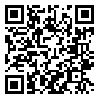Volume 10, Issue 4 (20 2012)
jhosp 2012, 10(4): 21-30 |
Back to browse issues page
Download citation:
BibTeX | RIS | EndNote | Medlars | ProCite | Reference Manager | RefWorks
Send citation to:



BibTeX | RIS | EndNote | Medlars | ProCite | Reference Manager | RefWorks
Send citation to:
Unresolved issues in medical tariffs: Challenges and respective. jhosp 2012; 10 (4) :21-30
URL: http://jhosp.tums.ac.ir/article-1-42-en.html
URL: http://jhosp.tums.ac.ir/article-1-42-en.html
Abstract: (11148 Views)
Background: Medical tariff is one of the most important tools for health policy making in a country
that influences equity, efficiency, quality and accountability of service deliveries. If relative values for
different services are not determined correctly, it may have negative consequences on availability and
sustainability of care. This study was designed to assess the challenges and respective solutions of the
tariff system in Iranian health sectors.
Materials & methods: This is a qualitative study, involving nine face to face interviews with health
managers, policy makers and researchers at the Ministry of Health and Medical Education and relevant
organizations, as well as public and private institutions and service providers who had experiences in
medical tariff. We used the thematic framework method for analyzing qualitative data.
Results: The problems and respective solutions were classified into stewardship power, policy
making and surveillance for tariff setting, structural organization of medical tariff system, methods and
principles of setting the tariffs, medical costs recording systems and other concepts related to the
medical tariff system in the health sector.
Conclusion: To improve medical tariffs system in the country, one need to have a deep
understanding of the current challenges and potential solutions in different levels. It is advisable to
follow a clear model based on focus on policy-making and stewardship of medical tariffs system as an
important cornerstone of any effort to rectify the current situation.
Received: 2011/04/9 | Accepted: 2011/07/6 | Published: 2013/08/6
| Rights and permissions | |
 |
This work is licensed under a Creative Commons Attribution-NonCommercial 4.0 International License. |



